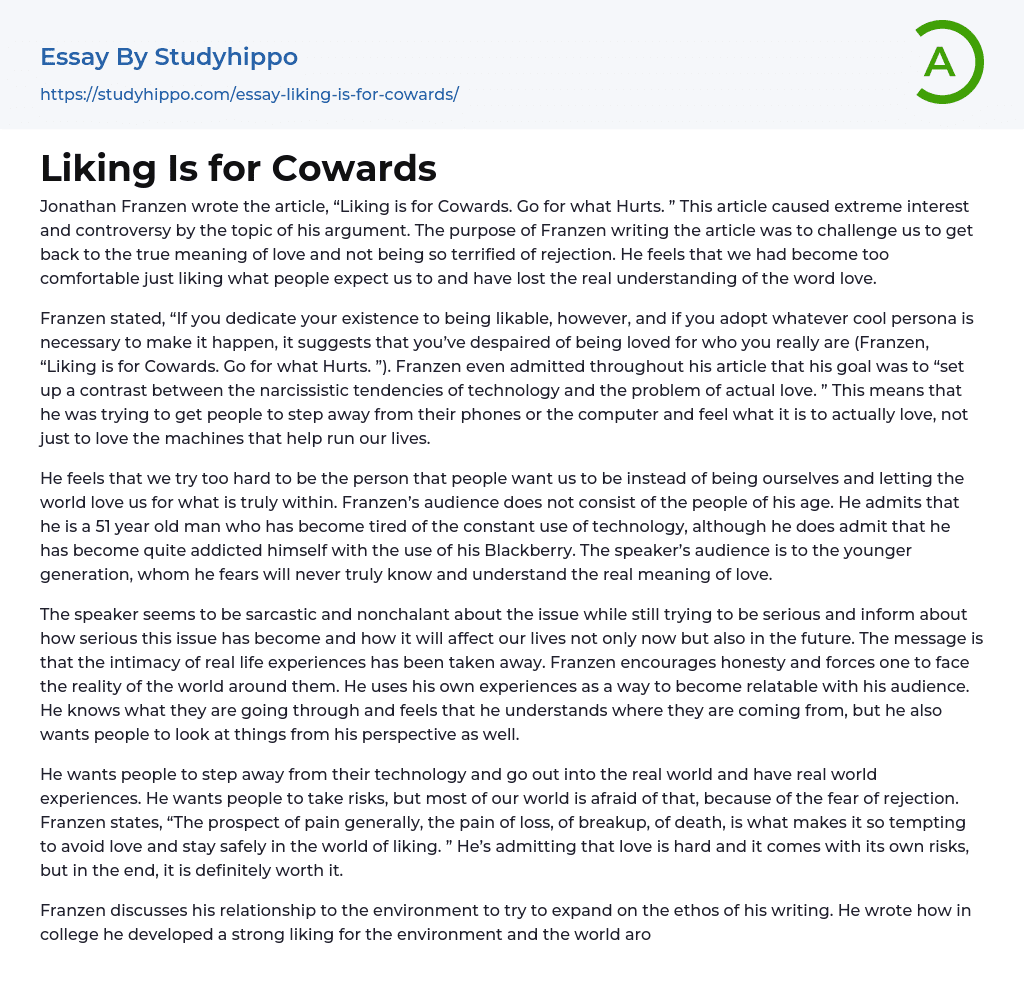Jonathan Franzen wrote the article, “Liking is for Cowards. Go for what Hurts. ” This article caused extreme interest and controversy by the topic of his argument. The purpose of Franzen writing the article was to challenge us to get back to the true meaning of love and not being so terrified of rejection. He feels that we had become too comfortable just liking what people expect us to and have lost the real understanding of the word love.
Franzen stated, “If you dedicate your existence to being likable, however, and if you adopt whatever cool persona is necessary to make it happen, it suggests that you’ve despaired of being loved for who you really are (Franzen, “Liking is for Cowards. Go for what Hurts. ”). Fra
...nzen even admitted throughout his article that his goal was to “set up a contrast between the narcissistic tendencies of technology and the problem of actual love. ” This means that he was trying to get people to step away from their phones or the computer and feel what it is to actually love, not just to love the machines that help run our lives.
He feels that we try too hard to be the person that people want us to be instead of being ourselves and letting the world love us for what is truly within. Franzen’s audience does not consist of the people of his age. He admits that he is a 51 year old man who has become tired of the constant use of technology, although he does admit that he has become quite addicted himself with the use of his Blackberry.
The speaker’s audience is to the younger generation, whom he fears will never truly know and understand the real meaning of love.
The speaker seems to be sarcastic and nonchalant about the issue while still trying to be serious and inform about how serious this issue has become and how it will affect our lives not only now but also in the future. The message is that the intimacy of real life experiences has been taken away. Franzen encourages honesty and forces one to face the reality of the world around them. He uses his own experiences as a way to become relatable with his audience. He knows what they are going through and feels that he understands where they are coming from, but he also wants people to look at things from his perspective as well.
He wants people to step away from their technology and go out into the real world and have real world experiences. He wants people to take risks, but most of our world is afraid of that, because of the fear of rejection. Franzen states, “The prospect of pain generally, the pain of loss, of breakup, of death, is what makes it so tempting to avoid love and stay safely in the world of liking. ” He’s admitting that love is hard and it comes with its own risks, but in the end, it is definitely worth it.
Franzen discusses his relationship to the environment to try to expand on the ethos of his writing. He wrote how in college he developed a strong liking for the environment and the world around us. He began to
be frustrated and discouraged by all of the negatives that the world faces every single day, such as rising global temperatures and the accumulation of garbage in the ecosystem. Eventually, he made a conscious decision to back away from the environment, but then he found a fascination with birds.
He felt a sense of love for the birds, and ironically, this made him even more concerned about the environment because that was the home of the birds that he had such a passion for. “And here’s where a curious paradox emerged. My anger and pain and despair about the planet were only increased by my concern for wild birds, and yet, as I began to get involved in bird conservation and learned more about the many threats that birds face, it became easier, not harder, to live with my anger and despair and pain,” Franzen admitted.
Franzen uses this story as a use of not only his ethos but also his pathos to become relatable to his audience. Although Franzen does seem sarcastic and nonchalant, one can feel the passion that he has for the topic. He truly wants his audience to know the real meaning of feeling and love. He doesn’t want the people to stay permanently in their comfort zone.
- Chief Executive Officer essays
- Convenience Store essays
- Firm essays
- Training And Development essays
- Unilever essays
- Variable Cost essays
- Virgin Group essays
- Bargaining essays
- Entity essays
- Pest analysis essays
- Child essays
- Childcare essays
- Child labor essays
- Doll essays
- Ambition essays
- Anger essays
- Betrayal essays
- Boredom essays
- Confidence essays
- Courage essays
- Desire essays
- Disgrace essays
- Doubt essays
- Empathy essays
- Fairness essays
- Fear essays
- Feeling essays
- Forgiveness essays
- Grief essays
- Guilt essays
- Happiness essays
- Harmony essays
- Hate essays
- Honesty essays
- Honor essays
- Hope essays
- Humanity essays
- Inspiration essays
- Kindness essays
- Laughter essays
- Loneliness essays
- Lost essays
- Loyalty essays
- Need essays
- Passion essays
- Pressure essays
- Pride essays
- Regret essays
- Respect essays
- Responsibility essays




